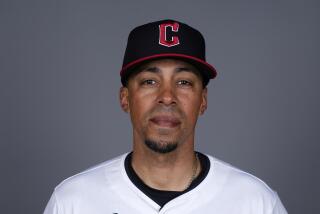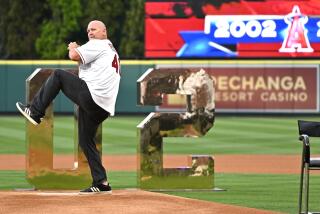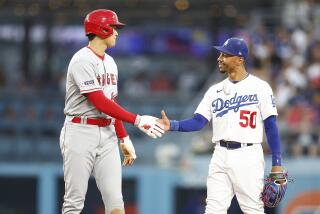High Heir Pressure : With the Departure of Harvey, Grahe Is Thrust Into Role of the Angels’ Closer
TEMPE, Ariz. — Joe Grahe sat dazed in front of his television. The telephone rang, but his body would not move.
It was as if his mind still was trying to comprehend what his eyes had just seen. He simply was not prepared for this.
The phone kept ringing that November morning, as teammates, friends, relatives and reporters tried to reach him.
“Everyone wanted to know how I felt about it,” Grahe said. “And really I had no answers. I was still trying to figure out what it all meant myself.”
On Nov. 17, the day in question, Bryan Harvey, the greatest bullpen stopper in Angel history, had been claimed by the Florida Marlins in the 1992 expansion draft.
Others were as stunned as Grahe, unable to fathom why an expansion team would be willing to pay $11.25 million for a relief pitcher coming off elbow surgery.
“I couldn’t believe that Harv was gone, just like that,” Grahe said. “I kept staring at the TV, wondering if it was some kind of mistake.
“I kept thinking, ‘What are we going to do without Harv in the bullpen?’ ”
Suddenly, it dawned on Grahe. The Angels were counting on him.
Grahe, who once had considered abandoning baseball for a career in jai alai, who flopped in each of the last two seasons as a starter, who strikes out hitters about as frequently as taxes are cut, is being ushered into the 1993 season as the Angels’ bullpen stopper.
His experience in the role?
Three months.
“I hope Joe gets his mind right real quick because the Angels are counting on him,” Harvey said. “I know he’s not the prototype closer, but it’s what’s inside that’s going to make or break him.”
Grahe, 6 feet and 200 pounds, doesn’t even resemble a prototype closer, much less pitch like one. Harvey overpowered hitters with his fastball and made them look foolish with his forkball. Grahe simply tries to induce ground balls or pop-ups.
“To tell you the truth, I’m not even sure what kind of pitcher you’d call me,” Grahe said. “I’m not a power pitcher, and I’m not a control pitcher, either.
“Basically, I just throw it toward the middle of the plate and trust it will move.”
Grahe struck out only 22 in 55 innings of relief last season, but earned 21 saves in 24 opportunities. In what was supposed to be an experiment while Harvey was on the disabled list, Grahe saved 20 of his first 21 opportunities.
“It was kind of fun to see the hitters’ reaction,” catcher Ron Tingley said. “They stepped up to the plate real eager to hit, like they were going to take him downtown. The next thing you know, you’d hear them swearing going down the first base line.”
Even Manager Buck Rodgers has a hard time viewing Grahe in the closer role.
“To me, there are only four or five legitimate closers in baseball, and Joe Grahe is not one of them,” he said. “He’s a part-time closer. To send him out there every game, I don’t know.
“I hope he proves me wrong, but that’s what we hope to find out.”
If the Angels really didn’t believe that Grahe could duplicate last year’s feat, they would have signed veteran free agent Jeff Russell.
And if they had not seen Grahe’s success for themselves, certainly they never would have left Harvey unprotected in the expansion pool.
“It became strictly a business decision,” Rodgers said. “We paid a guy $15.5 million over four years to save 40 games a year for us. Well, with his arm starting to bother him, we thought 40 games were in jeopardy.
“To tell you the truth, we don’t feel (Harvey is) ever going to be a 40-save guy again. He’ll save maybe 17, 18, 22 games, but now we’ve got Joe Grahe to do that.”
Most gratifying to the Angels is that Grahe might be able to do it for a lot less money. While Harvey is the highest-paid reliever in baseball history, Grahe earned only $135,000 last season and is expected to make less than $500,000 this year.
“You’ve got to be careful about these things,” Rodgers said. “I created a monster over there in Montreal with Tim Burke. He was making $2 million a year, and he was nothing more than a part-time closer who was getting the opportunities.
“I mean, I’ve had Rollie Fingers in Milwaukee and Jeff Reardon in Montreal, but I’d rather go to a bullpen by committee. If you have one closer, and he gets hurt, then your whole bullpen can fall apart.
“What I’d like to see, if (rookie) Troy Percival makes the team, work him in slowly and then (have him) share the closer’s role with Grahe. He’s the best bullpen prospect in our organization, but I don’t foresee either of them being a closer closer.”
Then again, Rogers never anticipated Grahe spending an entire summer in the big leagues. When Grahe washed out as a starter in 1991, and floundered in his seven starts last season--he was 2-3 with a 5.90 earned-run average--some of his teammates wondered if they would ever see him again. Grahe was optioned May 14 to triple-A Edmonton and for the first time feared for his career.
“My biggest problem was that I was trying to fit in so much with the rest of the guys in the rotation, I couldn’t find my own identity,” he said. “I was trying to be like (Mark) Langston, (Jim) Abbott, and (Chuck) Finley so much that I forgot who Joe Grahe was.
“I can’t pitch like those guys, but it was like I was trying to imitate everything they did. I was scared to death when I got sent down because I had such a major fear of failure.”
Grahe was recalled June 8, when Harvey was put on the disabled list. This time, the Angels told him, he was coming up as a reliever.
One night later, his life changed.
Summoned from the bullpen against the Chicago White Sox, Grahe ran to the mound, looked into the on-deck circle and winced. There was George Bell. The last time they had faced one another--the third game of the season--Bell hit a monstrous home run.
This time, instead of giving him a low fastball over the plate and watching as the ball sailed over his right shoulder, Grahe tossed him a changeup.
Strike three.
“That was the most important hitter I faced all year,” Grahe said. “It’s hard to explain, but that one moment gave me confidence the rest of the season.”
Despite his success, Grahe wants to return to the starting rotation.
“What I learned in the bullpen should help me as a starter,” Grahe said. “You can’t dwell on your last appearance as a closer, and that’s what I was doing as a starter. I’ve learned you have to have almost no conscience or you’ll go crazy.
“Guys can be busting their butts for 2 1/2 hours, and you can make it all go to waste by one bad outing. But you have to be callous to that approach, and that’s what I wasn’t doing as a starter.”
Still, as long as Grahe remains the Angels’ closer, his friends say it might be time to act the part. He has to grow a droopy mustache, yell obscenities at the hitters, stay in the clubhouse before the seventh inning, do virtually anything in his power to intimidate the opposition.
“Hey, those are for the big-time guys, not me,” Grahe said. “I’m not going to intimidate anybody, so why try?
“This is something I never dreamed I’d be doing in the first place, so I kind of feel like an outsider anyway.”
Didn’t Grahe at least wonder what it would be like to perform in one of the most celebrated roles in baseball?
“Yeah,” Grahe said, “I used to think about it.”
And?
“I thought, ‘God, I’d sure hate to do that. That’s got to be one hell of a miserable job.’
“You know what I learned? It ain’t too bad.”
More to Read
Go beyond the scoreboard
Get the latest on L.A.'s teams in the daily Sports Report newsletter.
You may occasionally receive promotional content from the Los Angeles Times.






